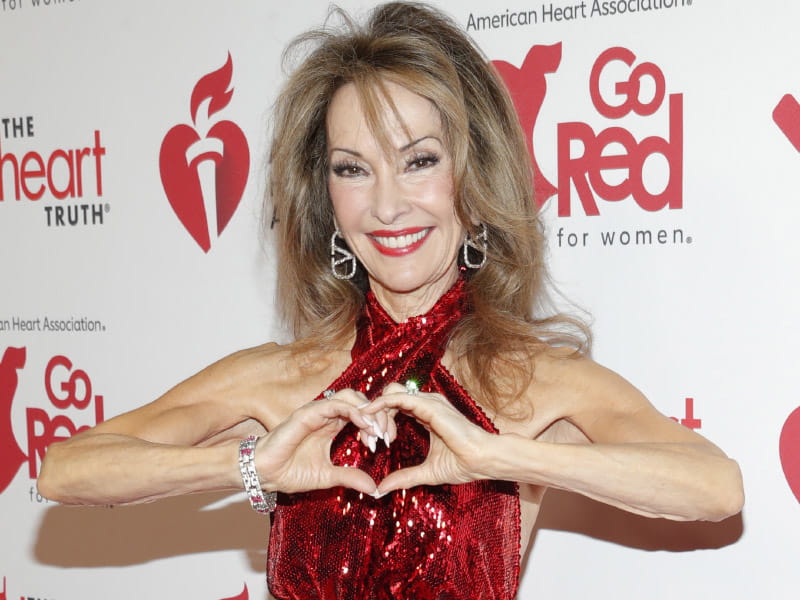Susan Lucci to be honored for off-screen role: fighting heart disease

For more than 40 years, Susan Lucci was the queen of daytime drama on the soap opera "All My Children," pouring her heart into portraying the iconic character Erica Kane.
But in 2018 and 2022, Lucci went through some very real heart dramas, when doctors discovered potentially fatal blockages of her coronary arteries.
After having stents placed in her heart, Lucci recovered and set out to tell her story and pass her good luck forward. Today, she speaks out on behalf of the American Heart Association's Go Red for Women initiative and has even lobbied about health issues on Capitol Hill.
For her longtime advocacy work and her devotion to raising awareness to fight heart disease, Lucci is being honored by the American Heart Association with its Voice of the Mission Award. She'll receive the honor at the AHA's 2025 National Volunteer Awards ceremony on June 17 in Plano, Texas.
"My dear friend Susan Lucci does an extraordinary job of sharing her heart for our mission," said American Heart Association CEO Nancy Brown. "I'm so grateful for her time, her tenacity and her passion for helping women understand that heart disease is their No. 1 health threat."
For Lucci, who had her first cardiovascular episode in 2018, it's personal. She had felt slight sensations in her torso in the previous weeks but dismissed them since she has always been extremely healthy.
Then, while shopping at a boutique, she felt "an enormous pressure (on my chest) and suddenly, I couldn't ignore it."
In that moment, Lucci flashed back to a TV interview she'd watched years earlier where a perfectly healthy woman described her heart attack symptoms as an elephant stepping on her chest. Lucci spoke with the boutique manager, who happened to have a degree in nursing. The manager quickly recognized Lucci's symptoms, stayed calm and helped the actress get to a nearby hospital.
"It was like I had two guardian angels, one on each shoulder," Lucci said.
At the hospital, doctors discovered one coronary artery was 90% blocked and a second, adjacent artery was 75% blocked. Left untreated, these blockages can lead to a heart attack, abnormal heart rhythms or even heart failure. Within hours, a cardiologist had placed stents — small, wire mesh tubes — to hold open her clogged arteries, and Lucci was discharged the next day.
Almost four years later, she felt a sharp pain in her jaw while alone at home. After dismissing it for a long time as a toothache, she finally went to the hospital, where doctors learned that an adjacent coronary artery had a 75% blockage, requiring the placement of another stent.
Having barely escaped a second potential heart attack, she felt "ashamed that I'd avoided calling the doctor for so long. I was dismissing all of my previous personal experience and slipping backward."
Today, she wants to encourage everyone — especially women — to listen to their bodies and take their heart health seriously.
"Most women, myself included, do not put ourselves first on our to-do lists. We take care of our families, homes and careers, but we aren't necessarily thinking of ourselves," she said. "But if your body's not behaving in a way that's normal to you, you have to act on it."
Lucci also urges people not to delay seeking medical help because they don't want to bother anyone or they're worried it's a false alarm. She's been there, done that, and is alive to warn others how deadly that can be.
"I remembered thinking 'I can't disturb this wonderful doctor and take him away from patients who need him. I'm going to be OK," she said.
"My message now is that you need that doctor, too. They'll be happy to send you home if you're fine. But if you're not, and you don't go to the hospital, the worst may happen."
As a national ambassador for the association's Go Red for Women initiative, she's joined researchers and survivors to lobby Washington lawmakers to improve policies aimed at fighting heart disease.
Cardiovascular disease kills more women than all forms of cancer combined. Among women 20 and older, nearly 45% are living with some form of cardiovascular disease. Yet women make up only 38% of participants in clinical trials, according to the American Heart Association.
"The amount spent to fund heart-health research for women is much lower than it is for men," she said. "It's absurd. Women are not little men. I would like to see research on an equal playing ground. Let's have parity there."

The 78-year-old actress thanks the AHA for honoring her with the Voice of the Mission Award and giving her the chance to "pass forward the message" and help create positive change.
"I'm thrilled that the American Heart Association has given me this opportunity," she said.
"I prayed for a way to use my platform to do more than just promote my acting projects. I didn't pray to have a near heart attack. But when I had that experience, I felt compelled to use my story to help other women assess their health, to maybe go have a cardiac CAT scan and, if they're feeling discomfort, to not just think 'It will go away.'
"My message, especially to women, is we have to put our health at No. 1 on our to-do list."





